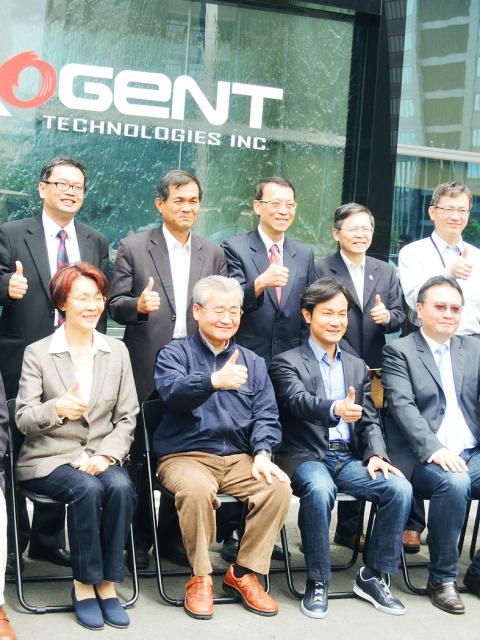Kaohsiung City Government officials yesterday rebutted Premier Mao Chih-kuo’s (毛治國) comments that southern Taiwan lacked job opportunities in the high-tech sector, saying the central government must shoulder some of the blame.
When visiting the Kaohsiung Software Park and experiencing first-hand some of the products yesterday, Mao said that a friend living in southern Taiwan told him that his son had recently gained a university degree but was unable to find a job in the technology industry in southern Taiwan.
The friend said that if his son looked for a job in northern Taiwan, he would have to dip into his retirement fund to help, Mao said, adding that his friend asked whether the government would be able to do something about the matter.

Photo: Ke Yu-hao, Taipei Times
Kaohsiung Deputy Mayor Hsu Li-ming (許立明), the city’s Economic Development Bureau Director Tseng Wen-sheng (曾文生) and a number of southern Taiwan university deans, present at the talk, appeared unhappy on hearing the comment.
Mao went on to say that he hoped Brogent Technologies, the booth he was visiting at the time, would help the nation find its path in the information technology industry, adding that he hoped the nation’s information and communication technology companies would step up its transition to add value to the industry.
After the event, Tseng, in response to reporters’ questions about Mao’s comments, said that Kaohsiung has made great strides in improving the performance of its industries, adding that as industrial planning and development policies were in the hands of the central government, it was also responsible for the lack of high-tech industry firms based in southern Taiwan.
A member of the public attending the event added that the Chinese Nationalist Party (KMT), had designated Kaohsiung as the nation’s main area for the petrochemical and iron industries, adding that any move toward high technology was after the city government developed the software park.
“The premier’s comments come as a slap in the face to the local government as well as to his own [central government],” said the member of the public who declined to be named.
Kaohsiung’s National Sun Yat-sen University dean Yang Hung-tun (楊弘敦) said that the industrial sector is beginning to take shape in the city, adding that 25 junior colleges as well as 10 to 20 businesses have formed an association to help students find jobs in the industry.
“We hope that students from southern Taiwan will be encouraged to stay and will not have to go to Taipei just to find a job,” Yang said.
Meanwhile, Kaohsiung City Councilor Lee Po-yi (李柏毅) of the Democratic Progressive Party (DPP) said that when Kaohsiung was rocked by the gas pipeline explosions last year, Mao, then-vice premier, did not visit, adding that since Mao became premier earlier this year, he had only visited the municipality two or three times.
“A premier who is not concerned about Kaohsiung is in no position to make such comments,” Lee said, adding that “Mao should be working with Kaohsiung and formulating policies that help the municipality’s high-tech industry find its footing instead of offering criticism.”

Alain Robert, known as the "French Spider-Man," praised Alex Honnold as exceptionally well-prepared after the US climber completed a free solo ascent of Taipei 101 yesterday. Robert said Honnold's ascent of the 508m-tall skyscraper in just more than one-and-a-half hours without using safety ropes or equipment was a remarkable achievement. "This is my life," he said in an interview conducted in French, adding that he liked the feeling of being "on the edge of danger." The 63-year-old Frenchman climbed Taipei 101 using ropes in December 2004, taking about four hours to reach the top. On a one-to-10 scale of difficulty, Robert said Taipei 101

A preclearance service to facilitate entry for people traveling to select airports in Japan would be available from Thursday next week to Feb. 25 at Taiwan Taoyuan International Airport, Taoyuan International Airport Corp (TIAC) said on Tuesday. The service was first made available to Taiwanese travelers throughout the winter vacation of 2024 and during the Lunar New Year holiday. In addition to flights to the Japanese cities of Hakodate, Asahikawa, Akita, Sendai, Niigata, Okayama, Takamatsu, Kumamoto and Kagoshima, the service would be available to travelers to Kobe and Oita. The service can be accessed by passengers of 15 flight routes operated by

Taiwanese and US defense groups are collaborating to introduce deployable, semi-autonomous manufacturing systems for drones and components in a boost to the nation’s supply chain resilience. Taiwan’s G-Tech Optroelectronics Corp subsidiary GTOC and the US’ Aerkomm Inc on Friday announced an agreement with fellow US-based Firestorm Lab to adopt the latter’s xCell, a technology featuring 3D printers fitted in 6.1m container units. The systems enable aerial platforms and parts to be produced in high volumes from dispersed nodes capable of rapid redeployment, to minimize the risk of enemy strikes and to meet field requirements, they said. Firestorm chief technology officer Ian Muceus said

MORE FALL: An investigation into one of Xi’s key cronies, part of a broader ‘anti-corruption’ drive, indicates that he might have a deep distrust in the military, an expert said China’s latest military purge underscores systemic risks in its shift from collective leadership to sole rule under Chinese President Xi Jinping (習近平), and could disrupt its chain of command and military capabilities, a national security official said yesterday. If decisionmaking within the Chinese Communist Party has become “irrational” under one-man rule, the Taiwan Strait and the regional situation must be approached with extreme caution, given unforeseen risks, they added. The anonymous official made the remarks as China’s Central Military Commission Vice Chairman Zhang Youxia (張又俠) and Joint Staff Department Chief of Staff Liu Zhenli (劉振立) were reportedly being investigated for suspected “serious